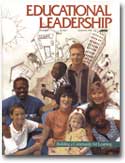Something eerie was in the air the day I traveled to a small, rural community in north central Mississippi to inaugurate a parent involvement program. I had been to this community before, and usually there weren't too many people on the streets. Adults were normally at work, most at a local mill. But on this particular Friday, the mill's parking lot was nearly empty, and the machinery was strangely silent.
As I approached the local elementary school, I wondered how many parents would attend the open house, where I was scheduled to describe the Quality Education Project (QEP), a program that attempts to increase student success through partnerships among schools, families, and the community. Much to my surprise, the parking lot was full. The halls were thronged with more than 300 parents who had accepted the school's invitation to visit their children's classes, view samples of their work, and attend the QEP orientation sessions.
How had this community attracted so many parents to the school on a workday? Prior to the orientation session with parents, a meeting had been held for businesses, churches, and community representatives. Among the people in attendance was the manager of a local mill, who stood, introduced himself, and expressed support for any effort that would strengthen the education of his present and future employees. His decision to close the mill so that parents could attend a parent involvement session at the local school proved him true to his words.
Meeting the Needs of Families
The Quality Education Project was introduced to Mississippi at the invitation of former Governor Ray Mabus and former State Superintendent of Education Richard Boyd. In 1989 it was initiated in seven school districts with funding through a grant from the U.S. Department of Education. As a native Mississippian, my job as program director has been to adapt the program, which was developed in metropolitan California schools, for use in Mississippi.
- All parents—regardless of social or economic status, race, or religion—love their children.
- The schools need the entire community working together toward an improved educational system.
Program field staff assist the schools by (1) garnering community support, (2) providing research-based training for parents and school staff in home-school communications and parenting skills, and (3) providing material support for program implementation. Because studies have identified active teacher participation as the determining factor in home-school relationships, much of the QEP training involves the school staff (Epstein 1984, 1987; Henderson 1987).
Empowering the Community
Community empowerment is everybody getting involved for a common cause. It is a fallacy that all parents do not want to participate in their children's education. Generally, the situation is one of parents not knowing how to get involved. That is why before our meetings, we send letters home to parents, distribute flyers to the community, and air announcements on radio and television stations. We urge the business community to become involved. Recognizing that a better-educated populace leads to greater productivity in the work force, business people have responded favorably. We also enlist churches, who need the school to assist in teaching morals, ethics, and values to children and families.
Because reading is a must for sustaining knowledge and skills, QEP promotes reading as the curriculum focus. We want our teachers to develop a wide repertoire of skills for teaching reading and related communication skills such as speaking and writing. We want our parents to learn to provide home-based reading activities with their children.
Further, we feel that the community should provide cultural and other interesting experiences for its citizens and that the citizens should eagerly participate. To encourage communities that support schools, we provide financial and human resource assistance to continue the education of parents. When the school and community initiate programs to help them improve their skills, parents can participate in the education of their children.
Serving People Through Partnerships
Getting a new program off to a successful start can be problematic, particularly when the people involved have different objectives and interests. Yet, every once in a while, experiences occur that help me to refocus and recommit to my purpose. Such was the case with the orientation session at the elementary school in this rural district.
Another rewarding experience was reading letters written by parents and children from project schools located primarily in the Mississippi Delta. With some of the richest soil in the world, ironically, the Delta is the most economically depressed area in the state. The comments below show the project's importance in the lives of these families.
One parent wrote: “I like it when we come to the teaching classes (the QEP Parenting Seminars) at school, and I learn to make my children stay still and study every night.”
Another parent related: “If my child doesn't bring her red (QEP) folder every Wednesday, I get mad with her because I want to see her work that the teacher sent me.”
A 4th grader who had mixed feelings about the QEP folder expressed: “Sometimes I like to take my red folder home. When I have good grades my mama will smile and hug me. Sometimes I don't do good on my papers and my mama don't hug me.”
Another child commented: “I like the letters (QEP newsletters) that my teacher writes to my parents every month. My teacher tells my mama and daddy what we have to learn, and then my mama and daddy study with me.”
Collaborating for a Common Cause
For each of our Mississippi QEP districts and communities, there are many stories to be told—and much work still to be done. However, I feel that we are on the right path. A community that pulls together in the initial planning stage and creates a plan for monitoring its progress can assist children and families in their efforts to become more productive. Parent involvement, community partnerships, and the coordination of local service agency initiatives will make a significant difference in the lives of children and their families.
